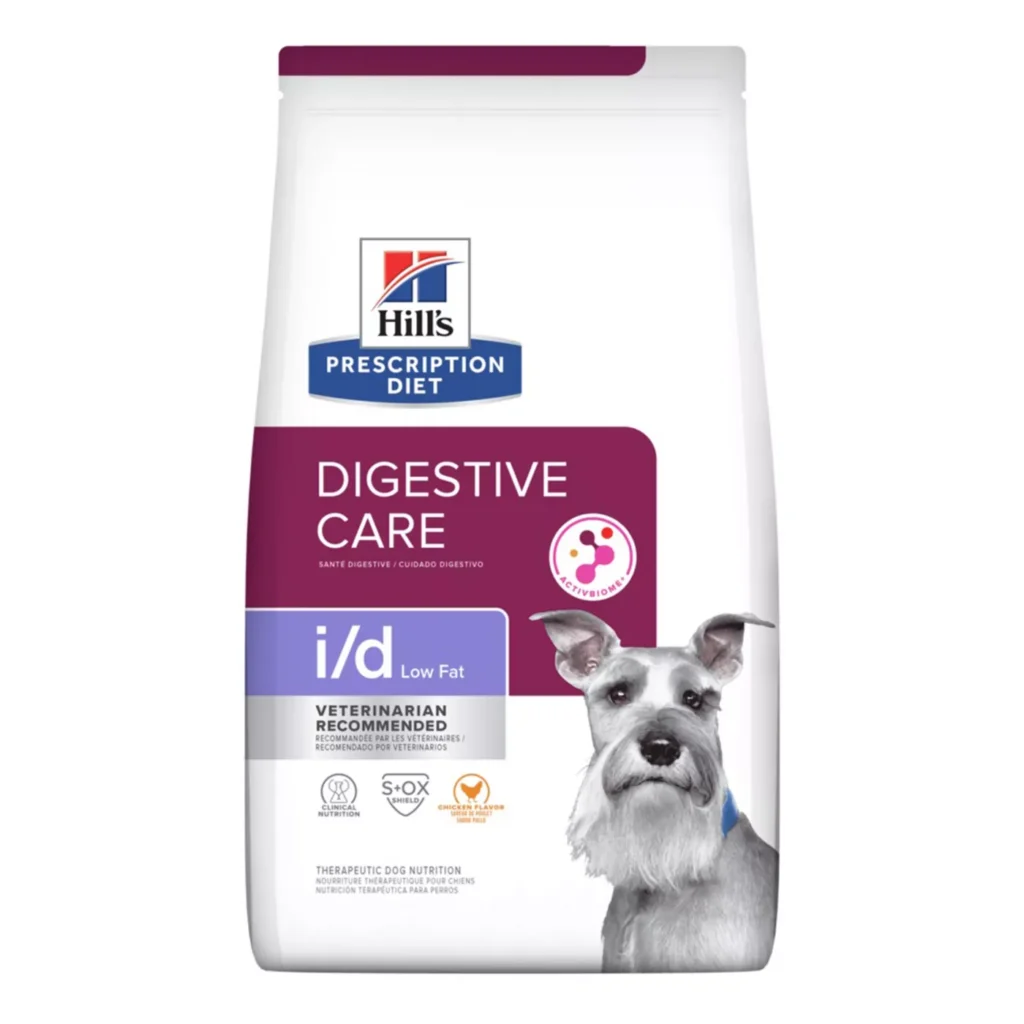Prescription dog food is specially formulated to treat specific health issues, while regular dog food is designed for general nutrition. Prescription diets often contain unique ingredients and nutrient profiles tailored to a dog's medical conditions.
Understanding the differences between prescription and regular dog food is crucial for pet owners. Many dogs require specialized diets due to allergies, kidney disease, or obesity. Regular dog food may not meet these specific needs, potentially harming your pet's health.
Prescription diets are often recommended by veterinarians and can support recovery or manage chronic conditions. They focus on targeted nutrition, helping dogs thrive despite their health challenges. Choosing the right diet can significantly impact your dog's quality of life and longevity. Always consult your vet before making dietary changes.

Table of Contents
ToggleIntroduction To Dog Nutrition
Understanding dog nutrition is key for pet owners. Dogs require a balanced diet. This diet must meet their specific needs. Two main types of food exist: regular and prescription dog food.
Regular dog food is available in stores. Prescription dog food is specially formulated. It helps treat medical conditions. This section will explore the basics of dog nutrition.
Essential Nutrients For Dogs
Dogs need a variety of nutrients for good health. These nutrients include:
- Proteins: Essential for muscle development.
- Fats: Provide energy and support skin health.
- Carbohydrates: Supply energy and aid digestion.
- Vitamins: Boost immunity and support overall health.
- Minerals: Important for bone health and metabolic functions.
Each nutrient plays a vital role. A balanced diet ensures dogs thrive. Regular dog food generally meets these needs.
Impact Of Diet On Canine Health
The right diet greatly affects a dog's health. Poor nutrition can lead to various issues. These issues may include:
- Obesity
- Skin problems
- Digestive disorders
- Joint pain
- Weakened immune system
Prescription dog food addresses specific health issues. It contains tailored ingredients. These ingredients promote healing and well-being. Regular food may not offer these benefits.
Choosing the right food is crucial. Consult a vet for personalized advice. This ensures your dog receives optimal nutrition.
Regular Dog Food Basics
Regular dog food provides essential nutrients for pets. It supports their health, energy, and overall well-being. Understanding its components helps in choosing the right food.
Common Ingredients
Regular dog food contains various ingredients. These ingredients ensure a balanced diet. Here are some common ones:
- Meat – Provides protein for muscle health.
- Grains – Supplies carbohydrates for energy.
- Fruits and Vegetables – Offers vitamins and minerals.
- Fats – Essential for skin and coat health.
- Additives – Enhances flavor and preserves freshness.
Nutritional Standards And Regulations
Regular dog food must meet specific nutritional standards. These standards are set by organizations like the AAFCO (Association of American Feed Control Officials).
Here’s a brief overview of the regulations:
| Aspect | Details |
|---|---|
| Protein | Minimum percentage varies by life stage. |
| Fats | Essential for energy and health. |
| Vitamins & Minerals | Must be balanced for overall health. |
| Quality Control | Regular testing ensures safety and quality. |
Choosing regular dog food requires understanding these factors. This knowledge ensures your dog gets the best nutrition.
Prescription Dog Food Explained
Prescription dog food is specially formulated for dogs with unique health needs. This type of food often requires a veterinarian's approval. Regular dog food does not have these specific health benefits.
Specialized Ingredients
Prescription dog food contains specialized ingredients designed for specific health issues. These ingredients help improve a dog's overall health. Common specialized ingredients include:
- High protein: Supports muscle health.
- Omega fatty acids: Promote healthy skin and coat.
- Fiber: Aids digestion.
- Antioxidants: Boosts immune function.
These ingredients are not always found in regular dog food. They focus on solving particular health problems.
Veterinary Formulations For Health Conditions
Veterinary formulations in prescription dog food target specific health conditions. Some common health issues include:
- Kidney disease: Low protein and phosphorus levels.
- Obesity: Reduced calorie content.
- Allergies: Limited ingredient diets.
- Digestive issues: Easy-to-digest formulas.
Veterinarians create these diets after evaluating a dog's health. Regular dog food does not provide this level of care.
| Feature | Prescription Dog Food | Regular Dog Food |
|---|---|---|
| Formulation | Specialized for health issues | General nutrition |
| Veterinary Approval | Required | Not required |
| Ingredients | Targeted ingredients | Standard ingredients |
| Availability | Veterinary clinics or authorized retailers | Pet stores and supermarkets |
Prescription dog food plays a critical role in managing health issues. Regular dog food may not suffice for dogs with specific needs.
Key Differences Highlighted
Understanding the differences between prescription dog food and regular dog food is essential. Each type serves a specific purpose. Knowing these distinctions helps you make informed choices for your pet's health.
Nutritional Content Comparison
| Feature | Prescription Dog Food | Regular Dog Food |
|---|---|---|
| Protein Source | High-quality, specific protein sources | Varied protein sources |
| Fat Content | Balanced for health conditions | Standard fat levels |
| Vitamins & Minerals | Enhanced levels for specific needs | General nutritional balance |
| Fiber | Tailored for digestive health | Moderate fiber content |
Prescription dog food often contains higher quality ingredients. It focuses on specific health needs. Regular dog food offers balanced nutrition for everyday health.
Intended Usage For Each Type
- Prescription Dog Food:
- Designed for specific medical conditions.
- Recommended by veterinarians.
- Targets issues like allergies or kidney disease.
- Regular Dog Food:
- Suitable for healthy, active dogs.
- Available in various flavors and brands.
- Focuses on general maintenance and wellness.
Choosing the right food is vital for your dog's health. Prescription dog food is for special needs. Regular dog food is for everyday feeding.
When Is Prescription Food Necessary?
Prescription dog food is vital for certain health issues. Regular dog food may not meet specific nutritional needs. Understanding when your dog requires prescription food is crucial for their health.
Common Health Issues Addressed
Prescription dog food targets various health concerns. Here are some common issues:
- Allergies: Food sensitivities can cause skin problems.
- Kidney Disease: Special diets support kidney function.
- Diabetes: Controlled carbs help manage blood sugar.
- Obesity: Weight management formulas help dogs lose weight.
- Digestive Problems: Easily digestible ingredients aid gut health.
Veterinarian's Role In Recommendation
Your veterinarian plays a key role in choosing prescription food. They consider your dog’s health history and current issues. Here’s how they help:
- Assess your dog's health condition.
- Recommend specific prescription diets.
- Monitor your dog's progress on the diet.
- Adjust the diet as needed.
Always consult your vet before changing your dog's diet. They ensure your pet receives the right nutrition.
Choosing The Right Food For Your Dog

Feeding your dog the right food is essential for their health. The choice between prescription dog food and regular dog food can be confusing. Understanding your dog's specific needs helps make the best decision.
Assessing Your Dog's Needs
Every dog is unique. Their dietary needs depend on various factors:
- Age: Puppies, adults, and seniors have different needs.
- Size: Small breeds and large breeds require different diets.
- Health conditions: Some dogs have allergies or medical issues.
- Activity level: Active dogs need more calories.
Consider these factors carefully. A well-balanced diet supports your dog's overall health.
Consulting With A Vet Nutritionist
Consulting a vet nutritionist is crucial. They help determine the best food for your dog. Here's how to prepare for the consultation:
- Gather your dog's medical history.
- List any allergies or sensitivities.
- Note your dog's activity level.
- Prepare questions about food options.
After the consultation, you will understand:
| Type of Food | Best For |
|---|---|
| Prescription Dog Food | Dogs with health issues |
| Regular Dog Food | Healthy dogs without special needs |
Choosing the right food keeps your dog happy and healthy.
Transitioning Between Food Types
Changing your dog's food can be tricky. This includes switching from regular dog food to prescription dog food. A slow and careful transition helps prevent digestive issues. It allows your dog to adapt to the new diet.
Best Practices For Switching Foods
Follow these best practices for a smooth transition:
- Gradual Change: Mix the new food with the old food.
- Start Slow: Begin with a small amount of the new food.
- Increase Over Time: Gradually increase the new food portion.
- Watch Portions: Maintain the same total amount of food.
Here’s a simple schedule for transitioning:
| Day | Old Food | New Food |
|---|---|---|
| 1-2 | 75% | 25% |
| 3-4 | 50% | 50% |
| 5-6 | 25% | 75% |
| 7+ | 0% | 100% |
Monitoring Your Dog's Reaction
Watch your dog closely during the transition. Look for these signs:
- Stomach Issues: Vomiting or diarrhea may occur.
- Appetite Changes: Notice if your dog eats less or more.
- Behavior Changes: Watch for signs of discomfort or lethargy.
Take advice from Pet Expert Dr Marty
ESA Pet is an online service that helps you get a legitimate ESA letter
Pet vitamin supplements and grooming products
If you notice any adverse reactions, slow down the transition. Consult your vet for advice. Keeping an eye on your dog ensures a healthy switch.
Cost Considerations
Understanding the costs of dog food is essential. The price can vary significantly between prescription and regular dog food. Owners must consider their budget while ensuring their pets receive the right nutrition.
Price Comparison
| Type of Dog Food | Average Cost per Bag | Typical Serving Size | Monthly Cost Estimate |
|---|---|---|---|
| Prescription Dog Food | $50 – $100 | 3 – 4 cups | $150 – $300 |
| Regular Dog Food | $20 – $60 | 2 – 3 cups | $60 – $180 |
Prescription dog food often costs more than regular food. It offers specialized nutrients for health issues. Regular food may provide balanced nutrition for healthy dogs.
Budgeting For Your Dog's Diet
- Assess your dog's specific needs.
- Compare prices at local stores and online.
- Factor in additional costs like treats and supplements.
Consider these budgeting tips:
- Set a monthly budget for dog food.
- Track your spending on dog food.
- Look for discounts or bulk buying options.
Investing in your dog's health is crucial. Choose the right food that fits your budget and your dog's needs.
Frequently Asked Questions About What is the Difference Prescription vs Regular Dog Food
What Are Prescription Dog Foods?
Prescription dog foods are specially formulated diets prescribed by veterinarians. They address specific health issues, such as allergies or kidney disease. These foods contain unique ingredients and nutrient profiles tailored for your dog's medical needs. Regular dog food does not provide these specialized benefits.
Can Regular Dog Food Replace Prescription Food?
Regular dog food cannot replace prescription food effectively. While it may be suitable for general nutrition, it lacks the specific nutrients required for medical conditions. Using regular food for a dog with health issues may worsen their condition. Always consult your veterinarian for the best dietary choices.
How Do I Know If My Dog Needs Prescription Food?
If your dog has specific health concerns, your veterinarian may recommend prescription food. Signs include allergies, obesity, or kidney problems. A thorough veterinary examination can help determine the need for a specialized diet. Always follow your vet's advice for your dog's health.
Are Prescription Dog Foods More Expensive?
Yes, prescription dog foods tend to be more expensive than regular options. This is due to their specialized formulation and high-quality ingredients. While the cost is higher, these foods are designed to improve your dog's health. Investing in your dog's well-being can save money on future health issues.
Conclusion
Understanding the difference between prescription dog food and regular options is crucial for your pet's health. Prescription diets target specific health issues, while regular dog food offers general nutrition. Always consult your veterinarian to determine the best choice for your furry friend.
Prioritizing their health can lead to a happier, healthier life.














